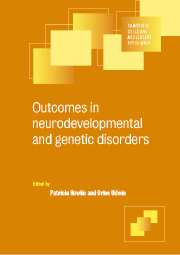Book contents
- Frontmatter
- Contents
- List of contributors
- Preface
- 1 Attention deficit hyperactivity disorder
- 2 Developmental language disorders
- 3 Reading and other specific learning difficulties
- 4 Metabolic disorders
- 5 Hemiplegic cerebral palsy
- 6 Autistic disorders
- 7 Down syndrome
- 8 Fragile X syndrome
- 9 Prader-Willi and Angelman syndromes: from childhood to adult life
- 10 Rett disorder
- 11 Tuberous sclerosis
- 12 Williams and Smith-Magenis syndromes
- Index
2 - Developmental language disorders
Published online by Cambridge University Press: 13 August 2009
- Frontmatter
- Contents
- List of contributors
- Preface
- 1 Attention deficit hyperactivity disorder
- 2 Developmental language disorders
- 3 Reading and other specific learning difficulties
- 4 Metabolic disorders
- 5 Hemiplegic cerebral palsy
- 6 Autistic disorders
- 7 Down syndrome
- 8 Fragile X syndrome
- 9 Prader-Willi and Angelman syndromes: from childhood to adult life
- 10 Rett disorder
- 11 Tuberous sclerosis
- 12 Williams and Smith-Magenis syndromes
- Index
Summary
Once a child develops the capacity to understand and use language then learning and social communication shift dramatically. When language development goes awry, children may suffer life-long consequences in terms of social, emotional, academic and vocational well-being. This chapter examines these long-term outcomes. Because relatively few studies have followed samples into adulthood, follow-up studies including adolescents will also be considered, on the assumption that the adolescent period is pivotal in establishing opportunities essential for full participation in the world of school, work and social relationships. The chapter will not only consider language impairment itself but the cognitive, achievement and social–emotional characteristics with which language impairment is associated.
Nature of language and communication impairments
The term ‘specific language impairment’ (SLI) is used to refer to problems in the acquisition and use of language, typically in the context of normal development (Bishop, 1997). Although the latter criterion is being debated, the term SLI will be used here to refer to individuals with normal overall cognitive development.
Speech/language pathologists and psychologists have broken language into broad categories of receptive and expressive language. These categories are divided further into phonology, morphology, syntax, semantics and pragmatics. Although interrelated, the latter aspects of language will be described separately. Individuals with SLI exhibit problems in combining and selecting the speech sounds of a language into meaningful units (phonological awareness) (Wagner & Torgeson, 1987; Bird, Bishop & Freeman, 1995).
Keywords
- Type
- Chapter
- Information
- Outcomes in Neurodevelopmental and Genetic Disorders , pp. 26 - 55Publisher: Cambridge University PressPrint publication year: 2002
- 6
- Cited by

